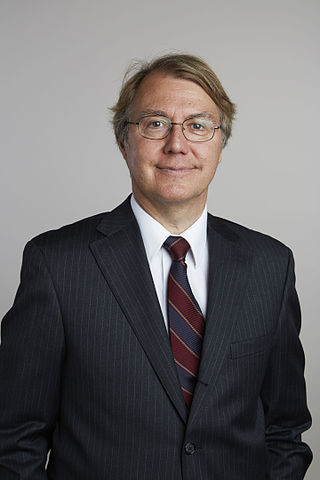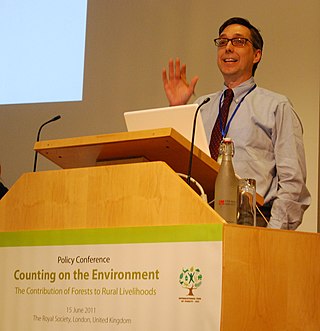Margaret Stratford Livingstone is the Takeda Professor of Neurobiology in the Department of Neurobiology at Harvard Medical School in the field of visual perception. She authored the book Vision and Art:The Biology of Seeing. She was elected a member of the American Academy of Arts and Sciences in 2015 and was elected to the National Academy of Sciences in 2020.

Chi-Huey Wong is a Taiwanese-American biochemist. He is currently the Scripps Family Chair Professor at the Scripps Research Institute,California in the department of chemistry. He is a member of the United States National Academy of Sciences,as awarded the 2014 Wolf Prize in Chemistry and 2015 RSC Robert Robinson Award. Wong is also the holder of more than 100 patents and publisher of more 700 scholarly academic research papers under his name.

Andrew Herbert Knoll is the Fisher Research Professor of Natural History and a Research Professor of Earth and Planetary Sciences at Harvard University. Born in West Reading,Pennsylvania,in 1951,Andrew Knoll graduated from Lehigh University with a Bachelor of Arts in 1973 and received his Ph.D. from Harvard University in 1977 for a dissertation titled "Studies in Archean and Early Proterozoic Paleontology." Knoll taught at Oberlin College for five years before returning to Harvard as a professor in 1982. At Harvard,he serves in the departments of Organismic and Evolutionary Biology and Earth and Planetary Sciences.
Laura Manuelidis is a physician and neuropathologist at Yale University.
Each species of slime mold has its own specific chemical messenger,which are collectively referred to as acrasins. These chemicals signal that many individual cells aggregate to form a single large cell or plasmodium. One of the earliest acrasins to be identified was cyclic AMP,found in the species Dictyostelium discoideum by Brian Shaffer,which exhibits a complex swirling-pulsating spiral pattern when forming a pseudoplasmodium.

William (Bill) DeGrado is a professor at the University of California,San Francisco,where he is the Toby Herfindal Presidential Professor of Entrepreneurship and Innovation in the Department of Pharmaceutical Chemistry. As an early pioneer of protein design,he coined the term de novo protein design. He is also active in discovery of small molecule drugs for a variety of human diseases. He is a member of the U.S. National Academy of Sciences (1999),American Academy of Arts &Sciences (1997) and National Academy of Inventors. He also is a scientific cofounder of Pliant therapeutics.
Graham R. Fleming is a professor of chemistry at the University of California,Berkeley and member of the Kavli Energy NanoScience Institute based at UCB.
In ecology,the term productivity refers to the rate of generation of biomass in an ecosystem,usually expressed in units of mass per volume per unit of time,such as grams per square metre per day. The unit of mass can relate to dry matter or to the mass of generated carbon. The productivity of autotrophs,such as plants,is called primary productivity,while the productivity of heterotrophs,such as animals,is called secondary productivity.

Sandra Pizzarello, D.Bi.Sc. was a Venetian biochemist known for her co-discovery of amino acid enantiomeric excess in carbonaceous chondrite meteorites. Her research interests concerned the characterization of meteoritic organic compounds in elucidating the evolution of planetary homochirality. Pizzarello was a project collaborator and co-investigator for the NASA Astrobiology Institute (NAI),the president of the International Society for the Study of the Origin of Life (2014-2017),and an emerita professor at Arizona State University (ASU).
Fumio Inagaki is a geomicrobiologist whose research focuses on the deep subseafloor biosphere. He is the deputy director of the Research and Development Center for Ocean Drilling Science and the Kochi Institute for Core Sample Research,both at the Japan Agency for Marine-Earth Science and Technology (JAMSTEC).
Ann Pearson is the PVK Professor of Arts and Sciences and Murray and Martha Ross Professor of Environmental Sciences at Harvard University and former chair of the Department of Earth and Planetary Sciences. Her research in the area of organic geochemistry is focused on applications of analytical chemistry,isotope geochemistry,and microbiology to biogeochemistry and Earth history.
Photothermal time (PTT) is a product between growing degree-days (GDD) and day length (hours) for each day. PTT = GDD ×DL It can be used to quantify environment,as well as the timing of developmental stages of plants.

Gerald Shively is an American economist and Professor in the Department of Agricultural Economics at Purdue University. He teaches and publishes research articles and books related to contemporary policy-related issues in economic development. His specializations are in poverty,food security and sustainable development.

Membership of the National Academy of Sciences is an award granted to scientists that the National Academy of Sciences (NAS) of the United States judges to have made “distinguished and continuing achievements in original research”. Membership is a mark of excellence in science and one of the highest honors that a scientist can receive.
Patricia Jean Johnson is a Professor of Microbiology at University of California,Los Angeles (UCLA). She works on the parasite Trichomonas vaginalis,which is responsible for the most prevalent sexually transmitted infections in the United States,Trichomoniasis. She was elected a member of the National Academy of Sciences (NAS) in 2019.
Susan Strome is a Distinguished Professor of Molecular,Cell,and Developmental Biology at the University of California Santa Cruz. Strome received a B.A. degree in chemistry from University of New Mexico and a Ph.D. in biochemistry from the University of Washington,as well as post-graduate work at the University of Colorado Boulder. Strome is a member of the American Academy of Arts and Sciences and the National Academy of Sciences.

Genetic regulatory circuits is a concept that evolved from the Operon Model discovered by François Jacob and Jacques Monod. They are functional clusters of genes that impact each other's expression through inducible transcription factors and cis-regulatory elements.
David Eusthatios Manolopoulos is a Professor of Theoretical Chemistry at University of Oxford. His research focuses on the computational modeling of the dynamics of elementary chemical reactions in the gas phase and quantum mechanical effects in chemical dynamics. His research highlights include work on path integral approach to molecular dynamics and chemical topics as diverse as fullerenes,ring polymers,reactive scattering,and more recently,the molecular and quantum mechanism of avian magnetoreception.
Matin Qaim is the Schlegel Professor of Agricultural Economics and Director at the Center for Development Research (ZEF) of the University of Bonn,Germany. His research focuses on issues of food security and sustainable development.
Brandon Stuart Gaut is an American evolutionary biologist and geneticist who works as a Distinguished Professor of Ecology and Evolutionary Biology at the University of California,Irvine.






